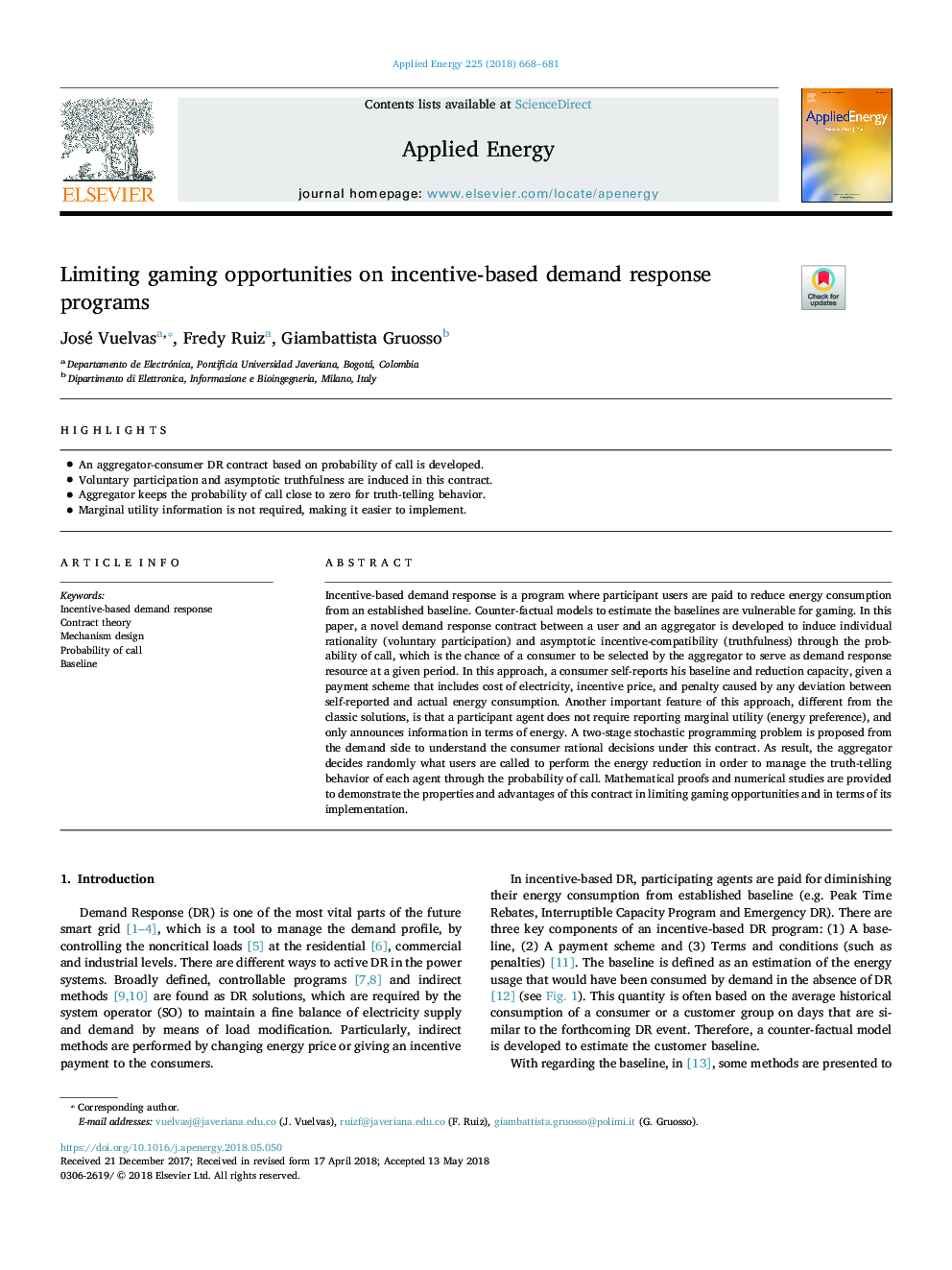| کد مقاله | کد نشریه | سال انتشار | مقاله انگلیسی | نسخه تمام متن |
|---|---|---|---|---|
| 6679957 | 1428065 | 2018 | 14 صفحه PDF | دانلود رایگان |
عنوان انگلیسی مقاله ISI
Limiting gaming opportunities on incentive-based demand response programs
ترجمه فارسی عنوان
محدود کردن فرصت های بازی در برنامه های واکنش تقاضای مبتنی بر انگیزه
دانلود مقاله + سفارش ترجمه
دانلود مقاله ISI انگلیسی
رایگان برای ایرانیان
کلمات کلیدی
پاسخ تقاضای مبتنی بر انگیزه، نظریه قرارداد، طراحی مکانیسم، احتمال تماس خط مقدم،
ترجمه چکیده
پاسخ تقاضای مبتنی بر انگیزشی یک برنامه است که در آن کاربران مصرف کننده برای کاهش مصرف انرژی از یک خط پایه ثابت، پرداخت می شوند. مدل های فاجعه آمیز برای تخمین خطوط پایه برای بازی ها آسیب پذیر هستند. در این مقاله، یک قرارداد پاسخ جدید تقاضای پاسخ بین کاربر و جمع کننده برای ایجاد عقلانیت فردی (مشارکت داوطلبانه) و سازگاری انگیزشی نامطلوب (صداقت) از طریق احتمال برقراری تماس، که شانس مصرف کننده را انتخاب می کند توسط جمع کننده برای خدمت به عنوان منبع پاسخ تقاضا در یک دوره معین. در این رویکرد، مصرف کننده خود را گزارش می دهد ظرفیت شروع و کاهش خود را، با توجه به طرح پرداخت که شامل هزینه برق، قیمت انگیزه، و مجازات ناشی از هر گونه انحراف بین خود گزارش شده و مصرف انرژی واقعی است. یکی دیگر از ویژگی های مهم این رویکرد، متفاوت از راه حل های کلاسیک، این است که عامل شرکت کننده نیازی به ارایه گزارش نهایی (اولویت انرژی) ندارد و تنها اطلاعات را از لحاظ انرژی اعلام می کند. یک مشکل برنامه ریزی تصادفی دو مرحله ای از طرف تقاضا برای درک تصمیمات منطقی مصرف کننده تحت این قرارداد پیشنهاد می شود. در نتیجه، جمع کننده تصمیم می گیرد که به طور تصادفی چه کاربران نامیده می شود برای انجام کاهش انرژی به منظور مدیریت رفتار حقیقت گفتن هر عامل از طریق احتمال تماس. اثبات ریاضی و مطالعات عددی ارائه شده برای نشان دادن خواص و مزایای این قرارداد در محدود کردن فرصت های بازی و از نظر اجرای آن است.
موضوعات مرتبط
مهندسی و علوم پایه
مهندسی انرژی
مهندسی انرژی و فناوری های برق
چکیده انگلیسی
Incentive-based demand response is a program where participant users are paid to reduce energy consumption from an established baseline. Counter-factual models to estimate the baselines are vulnerable for gaming. In this paper, a novel demand response contract between a user and an aggregator is developed to induce individual rationality (voluntary participation) and asymptotic incentive-compatibility (truthfulness) through the probability of call, which is the chance of a consumer to be selected by the aggregator to serve as demand response resource at a given period. In this approach, a consumer self-reports his baseline and reduction capacity, given a payment scheme that includes cost of electricity, incentive price, and penalty caused by any deviation between self-reported and actual energy consumption. Another important feature of this approach, different from the classic solutions, is that a participant agent does not require reporting marginal utility (energy preference), and only announces information in terms of energy. A two-stage stochastic programming problem is proposed from the demand side to understand the consumer rational decisions under this contract. As result, the aggregator decides randomly what users are called to perform the energy reduction in order to manage the truth-telling behavior of each agent through the probability of call. Mathematical proofs and numerical studies are provided to demonstrate the properties and advantages of this contract in limiting gaming opportunities and in terms of its implementation.
ناشر
Database: Elsevier - ScienceDirect (ساینس دایرکت)
Journal: Applied Energy - Volume 225, 1 September 2018, Pages 668-681
Journal: Applied Energy - Volume 225, 1 September 2018, Pages 668-681
نویسندگان
José Vuelvas, Fredy Ruiz, Giambattista Gruosso,
